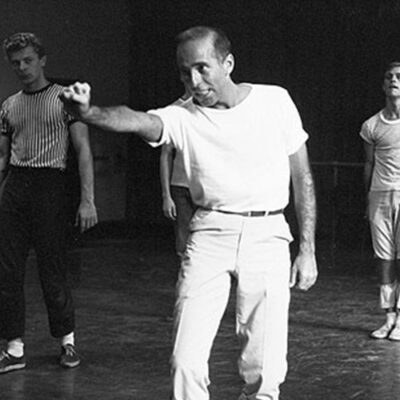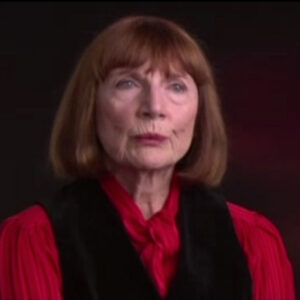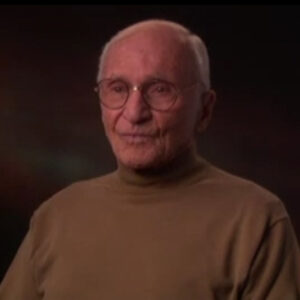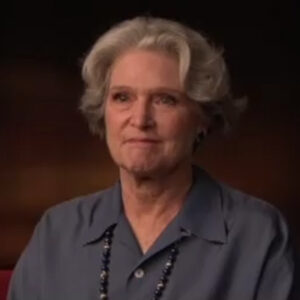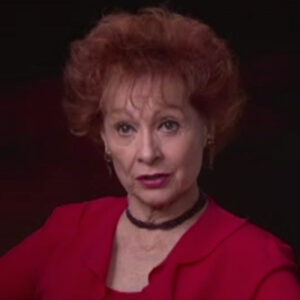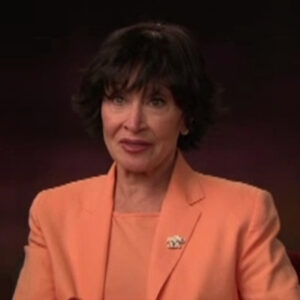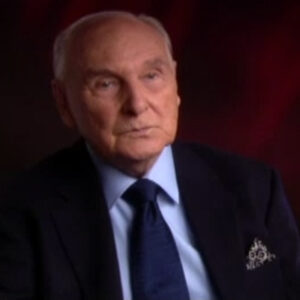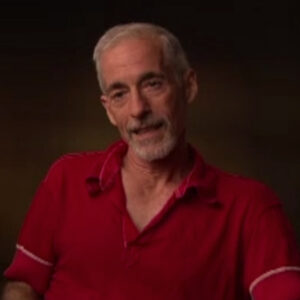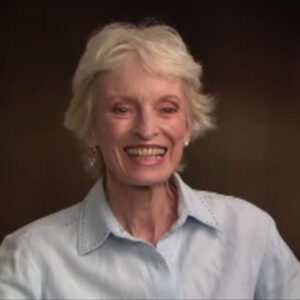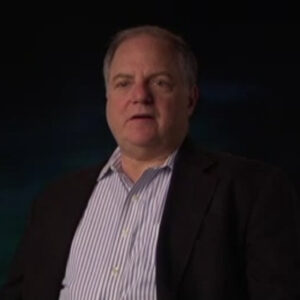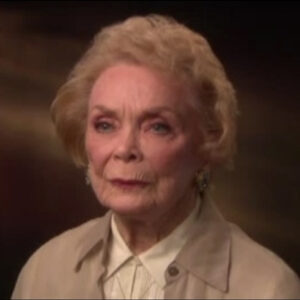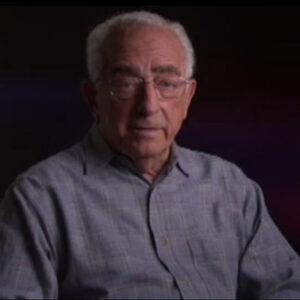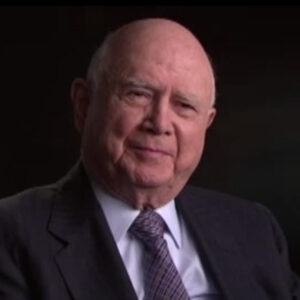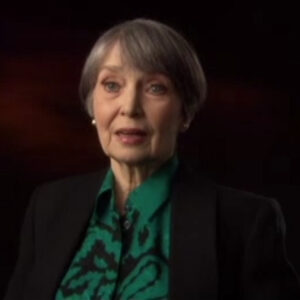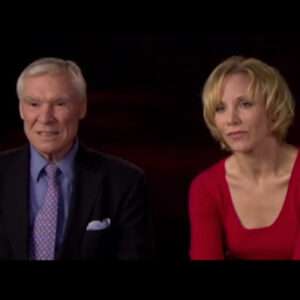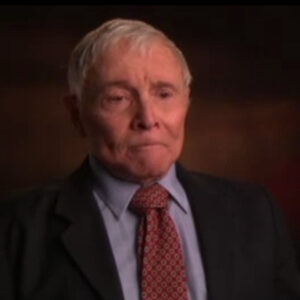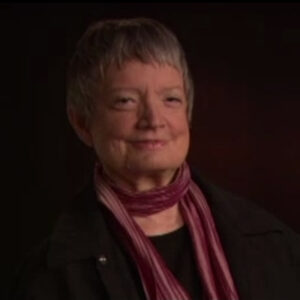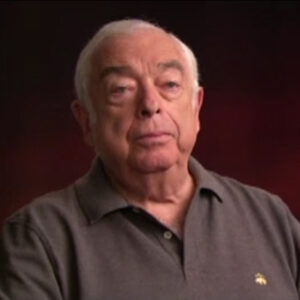Speaker So, Rose, tell me, if you would, about the night that you met Jerry Robbins, what year it was and exactly where were you?
Speaker I was at the Belasco Theater.
Speaker And it was a dance recital, the young man I was with knew Anita Alvarez, who was dancing in the recital. So he went backstage because I didn’t know Anita. I said I would wait outside. It was a balmy March evening. I leaned against the car and the people came out and then I saw Jerry walking towards me. Now, I knew who he was because I took evening ballet classes and he was in the class. He would come in just before the class started and leave just as the piano went boying. We started to applaud. He disappeared. So I don’t know. He didn’t see me. I know he didn’t see me. He walked up to me and he said, My name is Jerome Robbins, and if I don’t speak to you now, I may never find you. So I was terribly flattered. And, you know, if I didn’t know him, I don’t think I would have given him my telephone number. So he wasn’t exactly a stranger. I gave you my telephone number. I was a stylist at the time for a very cheap Spiegels catalog, which I understand now is a very big catalog. Anyway, he called me the following day and we made a date for dinner for the following night, and we went to Allen Dix on West 57th Street where a lot of entertainment people went and he said, I saw you and I thought you were quite beautiful and you looked interesting and I wanted to meet you. So, you know, I was in hog’s heaven. Anyway, he and I told them a little bit of myself. There wasn’t much to tell. I’m an immigrant girl living in the Bronx. I didn’t have much of a vocabulary. Those ears.
Speaker Hmm. Yeah. Sorry, sorry. I’m just getting your impression of Jerry.
Speaker Well, I was, I think, 26 of the time. I was a late starter and he was 27.
Speaker He had the most beautiful brown eyes. They were like, crying, laughing, I is the actress Diane West has those kind of eyes, you know, in the moment she could laugh and cry at the same time.
Speaker And he was just so beautifully proportioned. The head, the shoulders, the waist, just everything about him was perfect. And I found myself falling in love with him. Now, I wasn’t a virgin, but not sexually experienced, so. When Jerry and I finally got together and we became a couple after a couple of weeks where he really courted me and wooed me, whatever happened between us was wonderful. And he loved to cuddle and he loved to kiss, which I like more than anything else, you know, the closeness, the warmth. And he just grew more beautiful in my eyes every day.
Speaker And perhaps it was easier to have a relationship with him because I work during the day and he worked during the day and sometimes evenings, so when we got together, it was like honeymoon time all the time. He was preparing high button shoes, then preproduction I didn’t know was preproduction, but that’s what it was in retrospect. I think what he did was a very macho kind of thing.
Speaker Now, we didn’t know from Macho.
Speaker We knew from Besame Mucho, you know, which was a popular song of the day. So I just I just went with the flow. He opened up a whole new world to me. I had never been to an opera. I had never been to the theater. I’d never been to a concert. I never listened to classical music.
Speaker I I just didn’t do any of the things. My head was like a sponge. You know, everything went in there. And even after nine months when our relationship ended, I continued on that track and he introduced me to people that I ordinarily would not meet you because you’re going on. Oh, right. I want to just. Oh, yeah. OK, so.
Speaker It was the period of time went by and you were courting and then at what point did you make a decision and why did you make a decision to move in with him, which at that time was a pretty radical decision, right?
Speaker Yes, yes. Yes, it was. But my parents I had left home when I was 16 and a half, so I was really on my home, my own. I was living with three other girls at West 47th Street across the police station.
Speaker So I was accountable to no one, just myself, and when he proposed to me, he said he wanted to marry me and then we both decided it was a mutual decision, that I move in with him. I moved in with him and he had a housekeeper who came in every day. So she did the cooking and the cleaning. And sometimes she was a very good cook. So sometimes I told her what I liked and she made it. And the romance progressed that he was just lovely to me because he wanted something from me. He wanted to marry me for me to be the mother of his children. So I never saw the other side of Jerome Robbins that other people did.
Speaker What did he tell you about his, because I know he talked to you about his family. What do you remember that he told you about his family?
Speaker Well, I remember about Gerry’s family. He took me to Jersey to meet them at the time that I met Gerry, because I’m blond haired, blue eyed. I was always blond haired, blue eyed. I didn’t look particularly Semitic. So he never asked me what I was part of this very day. After two minutes of meeting somebody, they know I’m Jewish or I tell them and I’m very proud that I’m Jewish.
Speaker So when he brought me home and they discovered that I was Jewish. Well, joy, joy, joy and happiness. And they encouraged the relationship just as her sister encouraged him to come towards me at the Belasco Theater the night I met him.
Speaker What did he tell you about his parents? He loved his parents. But I felt that there was a distance.
Speaker I’m not going to say that Jerry was anti-Semitic because I don’t think that’s true, but I think at that point in his life, he would have given anything to wake up blond and blue eyed. Now, you know, it seems ridiculous because he was a brunette, you know, beautiful brown eyes. Those years he had beautiful brown hair. So I could understand this is within myself. I never discussed it with the. Why he wasn’t happy with himself, but you see, I knew nothing about Jerry, really, what was going on on the inside, which, of course, I found out.
Speaker We’ll get to that. Yeah.
Speaker Do you have any sense, knowing his parents and knowing his family, why he was conflicted about being Jewish?
Speaker No, I don’t. I met Sonja and of course, she was very warm and friendly. I met the mother and father and they were all more than more and warm and friendly.
Speaker There were, you know, middle class people working class. The father’s name was Harry, I think, and the mother’s name was Leah. That’s Lena. That’s right. And Sonia got to know a little better.
Speaker But I didn’t feel that Jerry was doing a duty by bringing home the girl, the woman that he wanted to marry and, you know, you had to present to your family. And of course, what I didn’t know in those days is why there was so ecstatic. I mean, I wasn’t such a bargain. Poor girl from the Bronx, immigrant girl. I came to this country in 1930, but nevertheless.
Speaker OK. Did he ever mention to you about when he went back to Poland, when he was a little boy and his his mother took him back to Poland, do you remember that at all?
Speaker No, never. I never knew that.
Speaker OK, I’ll tell you about right now. You started to talk about this before, but let’s go on a little bit. What was Jerry doing at the time that you met him? And tell me a little bit about the people that he was around and who you met through him?
Speaker Yes, Jerry, at the time that I met him, I was preparing high button shoes, which became a big success.
Speaker And we were surrounded by Nanette Fabray, who played the lead. I’m trying to think of the leading man. He’s no longer alive.
Speaker Jack, something or other I can’t remember. And I met Julie Steinman’s of her since.
Speaker Silvas, Phil Silvers, Phil Silvers, I’m just trying to remember who else he was around, I actually saw the show finished.
Speaker Didn’t you saw high button shoes when it was finished?
Speaker No, no, no, no. We lasted from March till November. March to November.
Speaker Now, when something happened. In the middle of the night, quite unexpected, that changed your whole relationship.
Speaker Boy, was it ever unexpected. We were asleep in the middle of the night. I don’t remember what time it was. There was knocking at the door. Jerry, Jerry, Jerry woke up. Jerry went downstairs. It was a Bazinet or duplex. And I heard some talk. Jerry came back upstairs. I said, what is it? He said, Oh, it’s Monty Clift. He’s drunk. Montgomery Clift, the actor. He had just returned from Hollywood from making his first film. So he said, I put him to sleep in the spare bedroom and he said, we’ll talk about it tomorrow. Tomorrow night, we won’t go out to dinner, will tell the woman to prepare something. And when I went to work, I looked into the spare room and there was Monty in his clothes that he wore. And Jerry put a blanket, had put a blanket over him that evening. I got home from work and we had dinner. And he was very somber. I just had that feeling. And then he started to talk and it was like a river opened up or as we say, no vocal diarrhea and this is a story he told me he and Jerry, well, he and Jerry and Monty were lovers.
Speaker Just go back a second to Tom.
Speaker Just go back to here’s the story he told me and here is the story that he told me he and Montgomery Clift were lovers, Monty went to California to make his first film. And Jerry was desolate, just bereaved. And as he was telling me, this chairs was running down his face and I didn’t know, you know, who knew about, as we call them then fairies in the water. I didn’t know about fairies on the bottom of a garden, so.
Speaker He continued and he said, But I don’t want to be that way. I don’t want to be with Monty. I don’t want to be with any man. I want to be with you. I want to be married. I want to have children.
Speaker Well, my head was in a whirl, I didn’t know what I was taking in.
Speaker But I’m a survivor and I always preserve myself.
Speaker And right then and there almost, I can say, and not just in retrospect, that what he was telling me. Wasn’t really so. That.
Speaker I can’t say that I know I was being used. But something was wrong and I just didn’t understand what was wrong.
Speaker And this is very sad, very sad. We were up most of the night talking, he did most of the talking because all that he told me was news news to me. Later, I found out that everybody in that little theater community knew that he was homosexual.
Speaker So I had to go to work or to be at work at nine, 30, and he had meetings, so we went to bed and he said, you know. Will continue, will continue, he said.
Speaker Montgomery Clift won’t come to the house anymore. No man will come to the house. It won’t happen again. You know, he was shaking and reassuring me it won’t happen again. And I just. I just knew that it was all wrong. Don’t ask me how and I don’t know, even today, it’s 60 years later. But what I did know, he was the first boy I was in love with, he was my first love and, you know, my husband who I met.
Speaker In 1968.
Speaker I didn’t carry Jerry in my head and my heart by that I lived so many different lives. My husband came here with Joan Littlewood’s company to do the hostage, and his English agent asked him to look me up. And when I saw him, he had that. Long Manolete, a face with the beautiful brown eyes, the brown hair proportioned beautifully, he was a little taller than Jerry, he was about five 11 and I thought. This is the well, I always liked Semitic looking men. And with him, I had a very happy marriage for 25 years, but I don’t think of Jerry ever all the time, but I think of him as my first love and I’m sad for him because I think he may. He was a genius. No, no denying. But I don’t think he had a happy personal life, whether he was in a relationship or not. And the only enjoyment that I I heard from other people that I still, you know, remained friends with is that the most important thing in his life was his work. And I do remember one occasion at a party and a soccer loves I hadn’t seen him about two years. I think he came up to me, he said, hello, how are you? I said, fine. And then he showed me some photos that were recently taken or perhaps even that day. Mark Splatting was a very famous theatrical portrait photographer, and he showed me the photographs and he was wearing a dark suit. And it was a black background. It looked very somber. And I said, so he yanked it away from me and he said, What do you know about photography? And I thought to myself, this is not a happy man.
Speaker He you told me that he was seeing a psychiatrist.
Speaker Well, together, oh, yes, oh, yes, of course, I forgot about that. He was seeing this woman psychiatrist who had been seeing for a long time when Montgomery Clift went to Hollywood and he was desolate. He told the psychiatrist and she and he also told her that he wanted to be heterosexual. He wanted to have a family. And she said, find a girl.
Speaker An attractive girl and intelligent girl, you know, one that you could be on the same level with you, which I certainly wasn’t at the time, and tried to start a relationship, and I was it.
Speaker Well, after you left, he’s had a relationship, I think, with somebody else who was a friend of yours. Tell me about Nora. What was she? Oh.
Speaker The relationship that he had with Nora Kay, who was America’s most brilliant, dramatic dancer, wonderful woman, until she opened up her mouth and then she sounded like a fish wife. And I love her. And I love her. Everybody loved her. Jerry announced their engagement to the newspapers through his press agent. While he was carrying on a long affair, a five year affair with Buzz Miller, who was a chorus boy, and Buzz also went to replicate Jerry’s dances and some some of his touring shows or another have found out. I mean, nobody went to Nora and said, Nora, you know, how can you be engaged to him? He’s. Doing whatever with with Buzz Miller, who’s a lovely guy, lovely, lovely, I’ve I met him. I know him. She felt betrayed. And many years later, when they moved to California and Herbert became a very Herbert Ross, she married, became a very important director and when she was dying of cancer. In one of her lucid moments, Herbert said to her, Jerry wants to come and see you. Jerry was in New York. She said, No, I don’t want to see him. Nevertheless, he flew out, maybe his guilt made. I don’t know, you know, at that point, I had no longer any contact with him. He flew out and she didn’t see him. He may have gone into the room, I forget what Herbert told me and see, nobody certainly did speak or say goodbye to her.
Speaker During the time that you were together, was Arthur Laurents around at all?
Speaker Did you meet Arthur during that? Yes, I met Arthur Laurents. What do you want me to say about off the alarms about their relationship? Well well, I think it’s my personal opinion. And also many people see Leonard Bernstein was a genius. Jerry, Jerry Robbins was a genius author. Lawrence was a brilliant writer, made a fantastic living out of it. But he was no genius. And I think that grazed him. He’s not one he’s not one of the nicest people I’ve ever met.
Speaker What was his relationship with Jerry like during that time?
Speaker I can’t say, I can’t say, OK, you know, we were so busy trying to solve our problems or Jerry’s. I had no problems. Jerry’s problem that he never told me. I said, well, how did it go at the office today? I couldn’t say that that we were busy because we had so little time, just the evenings I had to go to work in the morning that he never really discussed anybody. What was he like as a companion? Well, he was just lovely. He was just lovely.
Speaker He led me, he was like a teacher and I followed him because many things that I saw with with Jerry I had never seen before, heard before, read before.
Speaker And he was very patient with me. Now, I don’t know if we had married and intellectually I had caught up with him, whether, you know, whether pupil supercedes the teacher, whether he had nothing further to offer me, he would have tired of me.
Speaker I think if I married him, I don’t think it would have been a successful marriage. I just know that because any man who says he’s bisexual, there’s no such thing, he’s homosexual and the same thing with women.
Speaker They may try to be normal, but eventually, well, like Leonard Bernstein did when he was 70. I think he left his wife and he decided to lead the life that he was meant to lead. And I guess Jerry decided that before he was 70.
Speaker Is there anything else that you would like to tell me about Jerry?
Speaker Well, there is I don’t know if you can put it on the air, but when he went before the un-American committee, which, you know, is just awful, the story we were told was that Ed Sullivan said to him, if you don’t name names, I will have it in the papers, that your whatever the term for a homosexual in those years was. And he panicked because which was ridiculous. Oliver Smith wasn’t going to hire him. Julie Stein wasn’t going to work with him. Joe Kipnis wasn’t going to produce. Mr Abbott would turn on him. You know, it’s ridiculous. But he was so obsessed that his work might be taken away. So he goes before the committee and Dharamshala of who was a lovely, lovely man and a very talented playwright, writer in his inimitable way, said, well, what do you know? I’ve been fucked by the wicked fairy, which I think is just so adorable, so wonderful.
Speaker Um, did you ever talk to you about is he had belonged to a communist organization long before he met you, I think. But did you ever talk to you about that? About.
Speaker No, never. We never discussed politics because of my my political awakening really didn’t come until much, much later. Much later. Although I came from a very left wing family, I think they were all emotional left wingers, not the intellectual ones like most poor working class people who were oh, they put their faith in socialism, communism. That would bring them a better world. Well, and now we know the truth. Now we know the truth.
